Serviços Personalizados
Artigo
Indicadores
Links relacionados
-
 Citado por Google
Citado por Google -
 Similares em Google
Similares em Google
Compartilhar
Acta Commercii
versão On-line ISSN 1684-1999
versão impressa ISSN 2413-1903
Acta Commer. vol.23 no.1 Johannesburg 2023
http://dx.doi.org/10.4102/ac.v23i1.1187
ORIGINAL RESEARCH
Academic career management intervention at a South African university: A modified Delphi study
Nina BarnesI; Marieta du PlessisI; José FrantzII, III
IDepartment of Industrial Psychology, Faculty of Economic and Management Sciences, University of the Western Cape, Bellville, South Africa
IIOffice of the DVC: Research and Innovation, University of the Western Cape, Bellville, South Africa
IIIDepartment of Physiotherapy, Community and Health Sciences, University of the Western Cape, Bellville, South Africa
ABSTRACT
ORIENTATION: Understanding the components for an academic career management intervention programme, to enable the development of the required academic pipeline to achieve the strategic objectives of higher education institutions
RESEARCH PURPOSE: A consensus view across subject experts for a career management intervention programme to enable the progression of academic careers
MOTIVATION FOR THE STUDY: While academic career literature captures an array of normative designs of career management programmes to cultivate the required academic talent consortium, literature indicates a lack of a comprehensive and systematic approach for career management to provide a framework for successfully managing academic careers.
RESEARCH DESIGN, APPROACH AND METHOD: A modified Delphi technique was employed, by presenting an expert panel with the findings of a broader research project to initiate the consensus-seeking methodology - a systematic approach to obtain concordance on the experts' opinions through two rounds of structured questionnaires.
MAIN FINDINGS: The identified components are structured and presented in five main themes (categories), including: (1) institutional, (2) individual, (3) overlapping, (4) cultural and (5) external. The results show a strong agreement among the experts on the first four categories. The fifth (external) offers the lowest level of agreement, reminding that the higher education system is part of a broader contextual system; it should be understood within its operational context and time
PRACTICAL/MANAGERIAL IMPLICATIONS: Offering talent management practitioners and higher education leaders expert observations of the factors to consider while planning and implementing career management intervention programmes to enable academic career progression.
CONTRIBUTION/VALUE-ADD: A comprehensive and systematic approach for career management, providing a framework for successfully managing academic careers across the various career stages.
Keywords: academic career; career progression; career management intervention; modified Delphi; South African university.
Introduction
The growth and sustainability of developed and developing countries globally strongly depend on advancing academic careers as a capacity-building approach in higher education (Koehn & Uitto 2017), as knowledge creation and dissemination are critical deliverables of academics (Baruch 2013). In South Africa, a failure to invest in academic careers has far-reaching consequences and implications for the transformation, modernisation and renewal of the country, as determined in the National Development Plan (NDP) (2030) (Republic of South Africa [RSA], National Planning Commission [NPC] 2013:319). This includes addressing the vast challenges of inequality, poverty and the need for economic growth.
A national review conducted by the South African Council on Higher Education (CHE 2016) recognised the importance of developing and cultivating the academic profession as a critical component to unlock the research potential of the country. South African universities are encouraged to adopt a proactive approach to support emerging scholars' career progression (Lesenyeho, Barkhuizen & Schutte 2018). Universities and the national government's support increased significantly during the last decade to ensure more significant levels of expertise from academics. This includes the implementation of funding models and career management intervention programmes to develop and cultivate the academic profession (Department of Higher Education and Training [Republic of South Africa] 2019).
The value of career management intervention programmes, supporting the academics' career progression, is affirmed (Seema 2021; Undiyaundeye 2017). The academic profession, though, is generally regarded as self-directed, and academics are expected to lead and drive their careers through complex environments in higher education (Matsepe, Cross & Maluleke 2020). Career management concerns intervention, such as strategies and practices planning and shaping employees' development and progression. These requirements involve the organisation's talent management needs, ensuring a talent flow to establish and sustain the required talent consortium (Guan et al. 2015).
Academic career literature captures an array of normative designs of career management programmes cultivating the required academic talent consortium (Baruch & Peiperl 2000; De Vos & Cambré 2017); however, recent literature indicates a lack of a comprehensive and systematic career management approach to provide a framework for successfully managing academic careers across various career stages (Barnes, Du Plessis & Frantz 2021; Zacher et al. 2019).
This study represents the final stage of a broader research journey, exploring the components of an academic career management intervention programme. This study, therefore, aimed to identify a consensus view across subject experts on the components that should be considered for a career management intervention programme, to enable the career progression of academics, by applying a modified Delphi technique. The modified Delphi suitability was guided by Avella (2016); Hasson, Keeney and McKenna (2000); Vernon (2009) and Young and Jamieson (2001):
-
The ability for a verified approach of consensus building to assess the identified components for an academic career management intervention.
-
Applies to an area of interest with limited evidence, such as the career development of academics in all career phases.
-
Suited for application in the higher education environment, increasingly described as a demanding and challenging context.
-
Gather collective subjective judgements of experts, beneficial to understanding a systemic approach to career management, provided the limited research.
Research methodology
Design
A modified Delphi technique was an appropriate design for the study's objective, identifying a consensus view across subject experts on the components that should be considered for an academic career management intervention programme. A Delphi technique was identified as a systematic approach attempting to obtain consensus on experts' opinions (Hasson et al. 2000; Young & Jamieson 2001). This modified approach did not require the experts to generate an initial list of components (Avella 2016). The study presented the experts with the findings of a concept mapping approach, including the themes identified from a document analysis through a relevant systematic review and a qualitative exploration. This study formed part of a broader research project to initiate the consensus-seeking process, as suggested by Avella (2016).
Participant selection
Careful consideration and selection of the expert panel members were identified as a critical step during the study (Skulmoski, Hartman & Krahn 2007). Participant selection relies strongly on the knowledge and skills of the disciplinary concerned (Okoli & Pawlowski 2004). The researchers, therefore, identified and agreed on two categories of experts as a first step in the panel's selection. The target population included academics in an advanced or established career stage with comprehensive experience in all career phases, human resource (HR) practitioners and leaders with a profound understanding of academics' career progression and extended experience in the higher education sector.
The researchers identified and populated the two categories, identifying (listed) experts in their professional network, after confirming the two categories. This baseline list included a diverse demographic panel concerning gender and race, ensuring various lenses are considered for potential diverse perspectives. The identified experts were further requested to nominate additional individuals for inclusion on the list, acknowledging that networks are limited and could be biased. Sixteen experts were considered and invited to participate in the study.
Sample population and size
Purposive and snowball sampling techniques were employed to collect a sample population for the study. The potential participants received an invitation to participate, including an information sheet to inform them of the study objective, process and risks. The invitation elicited potential panel members' willingness to participate. Participants' informed consent was obtained through email, aligned to the quality indicator of distributing the Delphi questionnaire electronically (Boulkedid et al. 2011). Twelve experts who responded to the invitation presented a proper assembling of judgements regarding the topic (Hsu & Sandford 2007). The suitable size for a Delphi study varies concerning purpose and context (Skulmoski et al. 2007).
The participants comprised five academics in an established or advanced career stage. Professors and associate professors and seven HR practitioners and leaders with experience in five higher education institutions across South Africa were included. These HR practitioners and leaders have 29 years' talent management experience and 16 years' experience in the higher education sector, occupying positions of executive director, director and HR consultant and practitioner. The sample comprised 58% females and 42% males. The ethnicity included 50% white people, 33% mixed race people (a distinctly South African racial group) and 17% black people. Aligned with the indicators of quality, the selected panel of experts were heterogenous and assessed the components identified as empirical evidence upon which it is based. The panel of experts' diverse observations enriched the Delphi technique's results (Boulkedid et al. 2011).
Data collection
The data were collected according to the Delphi technique - a systematic approach attempting to obtain concordance on the experts' opinions through structured questionnaire 'rounds' (Hasson et al. 2000; Young & Jamieson 2001). Two rounds were facilitated to reach group consensus (Hsu & Sandford 2007).
During the first round, the experts were provided with an initial self-administered questionnaire through Google Forms - an online survey administrative tool. This procedure followed the quality indicator by Boulkedid et al. (2011), suggesting that online dispersion of questionnaires increases dissemination and saves time. This survey tool could further monitor the responses, directing reminders to the experts. This initial self-administered questionnaire was structured, commencing by confirming the required participant detail, including their gender, racial identity, profession, relevant talent management and higher education experience.
The remainder of the questionnaire was structured into five categories. Themes supported each category, encompassing subthemes representing the components identified for an academic career management intervention programme through a systematic review and qualitative exploration as part of the broader study. Experts were requested to rate their responses on a 5-point Likert scale, ranging from (mode):
1. not important
2. some importance
3. useful
4. beneficial
5. essential
Each section included an open-ended question for participants to identify factors or components omitted from the list or add further comments. Panel members received feedback as part of the second round after a preliminary first round analysis. During the second round, panel members were provided with an adjusted self-administered questionnaire for further panel engagement, creating an opportunity to add additional perspectives or to execute alterations.
Data analysis
The study included descriptive statistics to analyse the data after responses were populated onto an Excel® spreadsheet. Consensus among the participating experts was reached on most components, except for four factors that required further engagement after the first round. A universally agreed proportion of consensus does not exist for the Delphi as it depends on sample numbers, with the aim of the research and resources (Hasson et al. 2000). Literature suggests Delphi consensus typically ranges from 55% to 100% agreement, with 70% considered as the standard (Avella 2016).
For consensus to be reached during the first round, 75% of the participants had to rate 3 or higher on the 5-point Likert scale (Boulkedid et al. 2011; Hsu & Sandford 2007). In adherence to this recommendation, the 5-point Likert scale was dichotomised into two categorical sections, indicating non-consensus and consensus. Non-consensus comprises the ratings 'not important' and 'some importance'; consensus includes ratings such as 'useful', 'beneficial' and 'essential'. A consensus was, therefore, reached when the collective rating percentages within a dichotomised category represented 75% or more of participating expert responses. The mode was calculated to determine expert consensus strongly favoured and inherently best reflect the convergence of opinion among the experts. The list of factors could, therefore, be further refined to include essential factors and should be included besides the consensus reached. Others could be beneficial, but not critical, to be included in a career management programme.
Ethical considerations
Ethical clearance to conduct this study was obtained from the University of the Western Cape, the Humanities and Social Science Research Ethics Committee, reference number: HS19/6/41. The participants provided their written informed consent to participate. Participants' names were not requested during the survey or published in any results. The authors proactively decided on an audit trail to improve methodological rigour in the design, including a clear track of all theoretical, methodological and analytical decisions during the research (Koch 1994). The first author kept a journal dedicated to capturing this information, while the remaining authors were consulted as experienced researchers throughout the collection, analyses and data interpretation.
Results
The modified Delphi technique aimed to identify a consensus view across subject experts on the components that should be considered for a career management intervention programme to enable academics' career progression. During the first round, the components were structured and presented to the panel in five categories. Each category was underpinned by themes further encompassing subthemes, including the following categories:
-
Institutional
-
Individual
-
Overlapping
-
Cultural
-
External
Institutional
The institutional category includes the mechanisms to consider from an organisational perspective. The panel reached a consensus on all the components in the institutional category, as depicted in Table 1. Participants strongly favoured this category of components with a 100% consensus for most components, including a mode ranging between 4 and 5.
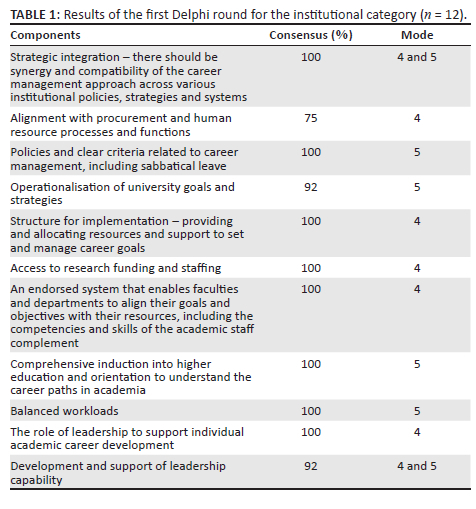
These excerpts include additional comments by participants to support their observations:
'Motivation from the Vice-Chancellor to create understanding for the critical need for career development.' (P1, female, HR leader)
'Career progression should ultimately be driven in the context of the organisation's needs to deliver its strategic objectives.' (P3, male, HR leader)
'While in the process of integrated career development, it is important to incorporate diversity and inclusion rather than regarding transformation as a side issue.' (P5, female, HR leader)
'Institutional level factors are important but often the key difference is made at a local or personal level.' (P6, male, established academic)
'… the biggest institutional stumbling block or enabler is probably the discrepancy or alignment between what is asked for by management and what is actually enabled and assessed. An academic career is a long vision and some major changes to the goalposts can disadvantage some individuals who were working towards an institutional goal or criteria, and the change means they are left behind while others overtake them on new criteria.' (P7, male, established academic)
Individual
This category includes components that should be considered from an individual perspective, including academics' career management competencies. The panel reached a consensus on most components in this category, except for the item relating to the demographics, including race, age and gender. The mode further ranged between 4 and 5 for several items where consensus was reached, with two including a mode of 3. These results are indicated in Table 2.
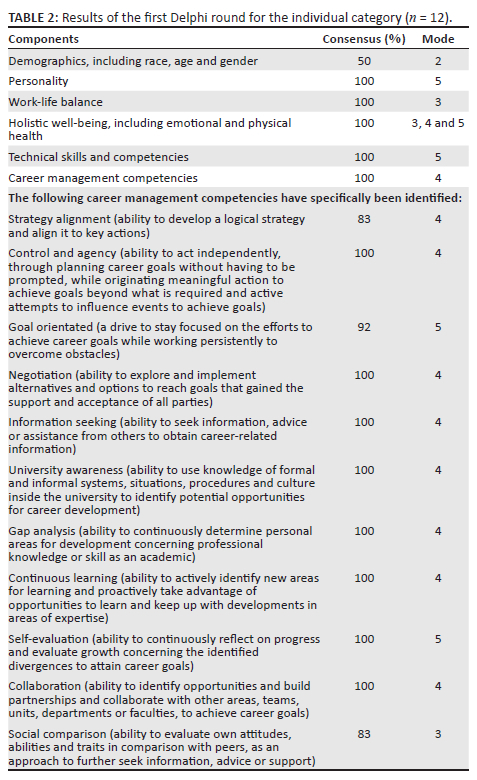
These excerpts are additional comments included by the panel:
'Short term and long-term personal development plan [PDP] may be beneficial, where both the individual and line manager take responsibility.' (P5, female, HR leader)
'I would add that across departments, faculties and disciplines, there are important differences. Some disciplines permit [or insist on] working alone or independently, others require teamwork and collaboration. This obviously impacts on which skills and abilities are important. Fine artists, for example, often work alone. Big Health Sciences projects [and Physics] often include huge teamwork requirements.' (P6, male, established academic)
'Ability to hold true to your values and trust in yourself at all times.' (P7, male, established academic)
'The issue of gender and race may possibly be underplayed. While the institutional policies should be inclusive and address promotion in an equitable fashion, I do think the elephant in the room [i.e., stereotypes and norms] should be addressed at the individual level. For instance, women may need more training on negotiating work responsibilities in a strategic manner. Also, where individuals from different ethnicities lack social capital and role models, an effort should be made to address this.' (P9, female, established academic)
Overlapping
This category includes the actions and engagement of both the organisation and individuals, comprising institutional and individual goal alignment, roles, needs, expectations and values. The panel reached a consensus on all components in this category, including a mode of 4 and 5, as indicated in Table 3.
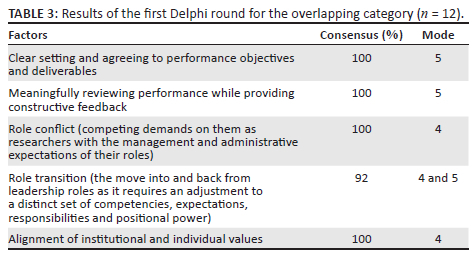
The following excerpt includes an additional comment shared by a participant:
'Managing both independence and interdependence with others and the workplace.' (P1, female, HR leader)
Cultural
This category includes the profoundly held principles, ideals or beliefs that the institution and individuals should embrace to reinforce their strategies, practices and behaviours. The panel reached a consensus on the components in this category, including a mode of 4 and 5, as indicated in Table 4.
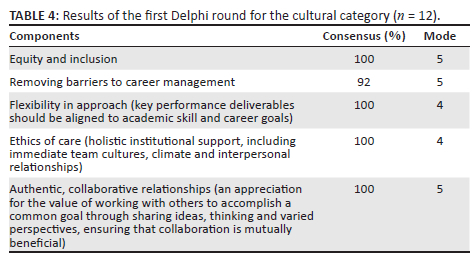
The following excerpts embrace additional participant comments, supporting their observations:
'Interdependence to be regarded as a competency.' (P1, female, HR leader)
'… in reality, these aspects can't be managed or commanded. Things like ethics, care, flexibility, inclusion are all important, but they "happen" as a result of relationships, not as a result of policies. There is an idea that managers [in their managerial roles] can make these things happen. My experience is that they can't, and they often compound matters by referring to policy to justify decisions that are felt as oppressive or unsympathetic or irrational. Our university talks about "inclusion", but my experience of approaches to inclusivity is often that they are based on excluding groups of staff and students (most often on grounds of race) and that this is justified as a necessary transformational strategy or practice to right the wrongs of the past. There is real tension between policies that try to change universities [social engineering] and developing healthy collegial relationships.' (P6, male, established academic)
'Not everyone wants to have the same career path, yet we seem to then be led to believe it is failure. Let us be honest and function well where we want to be on the ladder.' (P7, male, established academic)
External
This category includes external factors to the university's environment, directly affecting the internal operations. The average percentage agreement was the least in this category. Consensus was reached among the experts, with a mode ranging between 3 and 4, as indicated in Table 5.
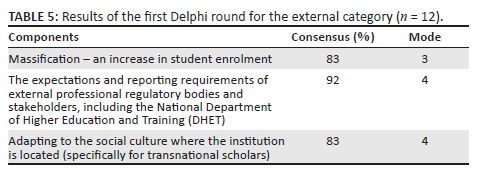
The additional panel comments below support their observations:
'Understanding the context will bring success.' (P1, female, HR leader)
'Collaboration with other institutions of higher learning, especially those who are similar. For example, Traditional Universities or Comprehensive Universities or Technikon Universities. This categorisation may influence the nuances of skills and competencies of academics.' (P5, female, HR leader)
'Massification of students at universities adversely impacts academic staff - increases workloads, increases responsibilities for larger number of under-prepared students. The same is true for professional accreditation as it is often important and essential … professional accreditation process places extra burden on the academics.' (P6, male, established academic)
An initial analysis of the above first round informed the components identified for further engagement, allowing panel members to alter or add additional perspectives during a second round. These components (Table 6) comprised the demographic component where consensus could not be reached, including race, age and gender; three components, indicating work-life balance, social comparison and massification, held a mode of 3. The self-administered questionnaire was, therefore, adjusted by requesting experts' observations by selecting 'essential and should be considered' or 'useful (not critical) and could be considered'.
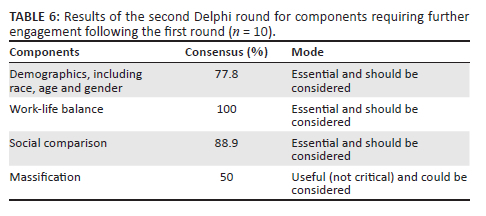
The second-round results were then reprocessed; panel members were presented with final feedback.
Discussion
The study aimed to identify a consensus view across subject experts on the components that should be considered for a career management intervention programme to enable the career progression of academics, by applying a modified Delphi technique. The identified components are structured and presented in five main themes (categories), including: (1) institutional, (2) individual, (3) overlapping, (4) cultural and (5) external (see Figure 1).
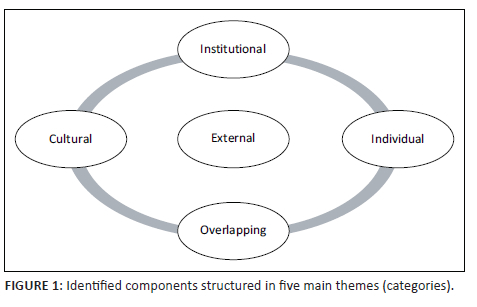
The study findings confirm a strong agreement among the experts on the first category relating to institutional components. This category includes the strategic integration and implementation of institutional policies, strategies and systems, which should be driven by the institution's needs to deliver its strategic objectives.
The leadership function is important in leading academic career progression. This finding aligns with the need for strategic integration of talent or staff-related strategies into an organisation's priorities and direction, as captured in the discipline of a strategic and integrated talent management approach (Shet 2020).
Demographics concerning gender, race and age required further engagement, although substantial agreement existed among the experts regarding the importance of the individual components that should be identified. The experts reached a consensus during the second round, acknowledging the influence of individual identity and lived experiences as 'essential'; it should be considered for an academic career management intervention programme.
Consensus regarding additional individual components was reached during the first round, with the career management competencies, work-life balance and the social comparison competency regarded as 'useful' but not 'beneficial' or 'essential', resembling the other identified components. The consensus was, however, reached during the second round, indicating that it is 'essential' and should be considered. This finding recognises the individual as fundamental in holding a range of intrapersonal influences on the career development process (McMahon, Watson & Patton 2015).
The overlapping and cultural categories received the highest agreement level among the experts, indicated as 'beneficial' and 'essential' to consider for an academic career management intervention. This finding emphasises the critical interdependent function and need for academics and the institution to continuously and sensitively engage to ensure meeting the functions, goals, needs, values and expectations of both parties. The following participant's excerpt supports their observation:
'In general, a higher degree of sensitivity should be displayed when staff are addressed on their career needs. It is mostly the manner in which people are dealt with that creates negativity rather than the action that needs to be taken; for example, lack of budget or no posts can be discussed in a reasoning fashion as opposed to just dismissive feedback. This is a very important factor relative to what people experience.' (P7, male, established academic)
This finding aligns with performance management processes, focusing on the condition's criterion for engaging knowledge workers (Saks & Gruman 2020). This conclusion further acknowledges the principle of a Performance Management System (PMS), presenting a platform to identify institutional and individual goals while confirming the required resources. Concurrently, employee engagement appreciates the self-directed nature of the academic as a knowledge worker at the centre to encompass a higher facilitation engagement rather than management's directive or punitive approach (Dahling et al. 2017).
The external category received the lowest agreement level among the experts during both rounds, with massification identified as 'useful' and 'not critical to consider for an intervention programme'; however, a 2-year duration exists between the data collection phase of the broader study and this Delphi study. The participants identified massification during the more comprehensive investigation. The ratings and additional observations shared by the panel in the study prompt that the higher education system is part of a broader contextual system. This reflection aligns with the observation that institutions should be understood within their operational context and time (Szelągowska-Rudzka 2018).
Noting that this study forms part of a broader research project, the findings could not be extended to the broader research population (Creswell 1994). A modified Delphi technique was employed, including two rounds, by presenting an expert panel with the findings of the broader research project to initiate the consensus-seeking methodology. This study therefore addresses the limitation of the preceding qualitative phases as interviews were limited to academic staff at the respective university.
Limitations and recommendations
The study acknowledges that the results of a modified Delphi technique do not offer indisputable facts. Instead, it offers a snapshot of expert opinion, for that group, at a particular time, which can be used to inform thinking, practice or theory. As such, Delphi findings should be compared with other relevant evidence in the field and verified with further research to enable findings to be tested against observed data to enhance confidence (Hasson & Keeney 2011).
Conclusion
In conclusion, the study presents a consensus view across subject experts on the components that should be considered for a career management intervention programme, to enable the career progression of academics, by applying a modified Delphi technique. The results reveal a strong agreement level for components identified within the institutional category and those at an individual level, including the career management competencies.
The highest agreement level was reached for the overlapping and cultural elements, emphasising the critical interdependent function and need for an academic and the institution to engage sensitively and continuously while aligning their goals, needs, values and expectations. The lowest level of agreement was reached for components identified in the external category. The study emphasises the importance of the higher education context within the time it operates.
The study offers higher education leaders and talent management practitioners an expert observation of the factors to consider during the planning and implementing career management intervention programmes, enabling academic career progression. The study further contributes to a comprehensive and systematic career management approach for academic careers across various career stages.
Acknowledgements
Competing interests
The authors have declared that no competing interest exists.
Authors' contributions
N.B., M.d.P. and J.F. all made substantial contribution to the conception and design of the study, together with the analysis and interpretation of the data. While N.B. drafted the manuscript, M.d.P. and J.F. critically revised it for important content. All authors approved the final version for submission of the manuscript.
Funding information
The research was financially supported by the Academic Doctorate Advancement Programme Towards Transformation (ADAPTT).
Data availability
The data that support the findings of this study are available from the corresponding author, N.B., upon reasonable request.
Disclaimer
The views and opinions expressed in this article are those of the authors and do not necessarily reflect the official policy or position of any affiliated agency of the authors.
References
Avella, J.R., 2016, 'Delphi panels: Research design, procedures, advantages, and challenges', International Journal of Doctoral Studies 11(1), 305-321. https://doi.org/10.28945/3561 [ Links ]
Barnes, N., Du Plessis, M. & Frantz, J., 2021, 'Career management programmes for academics in the higher education sector: A Re-AIM systematic review', South African Journal of Higher Education 35(5), 4-22. https://doi.org/10.20853/35-5-4012 [ Links ]
Baruch, Y., 2013, 'Careers in academe: The academic labour market as an eco-system', Career Development International 18(2), 196-210. https://doi.org/10.1108/CDI-09-2012-0092 [ Links ]
Baruch, Y. & Peiperl, M., 2000, 'Career management practices: An empirical survey and implications', Human Resource Management 39(4), 347-366. https://doi.org/10.1002/1099-050X(200024)39:4<347::AID-HRM6>3.0.CO;2-C [ Links ]
Boulkedid, R., Abdoul, H., Loustau, M., Sibony, O. & Alberti, C., 2011, 'Using and reporting the Delphi method for selecting healthcare quality indicators: A systematic review', PLoS One 6(6), e20476. https://doi.org/10.1371/journal.pone.0020476 [ Links ]
Council on Higher Education (CHE), 2016, South African higher education reviewed: Two decades of democracy, Council on Higher Education, Pretoria, viewed 26 October 2020, from https://www.researchgate.net/publication/312889357_South_African_Highe r_Education_Reviewed_Two_decades_of_Democracy_including_chapter_on_Governance. [ Links ]
Creswell, J.W., 1994, Research design: Qualitative & quantitative approaches, Sage, Thousand Oaks, CA. [ Links ]
Dahling, J.J., Gabriel, A.S. & MacGowan, R., 2017, 'Understanding typologies of feedback environment perceptions: A latent profile investigation', Journal of Vocational Behavior 101, 133-148. https://doi.org/10.1016/j.jvb.2017.05.007 [ Links ]
Department of Higher Education and Training (Republic of South Africa), 2019, Staffing South Africa's university framework, viewed n.d., from https://www.dhet.gov.za/SitePages/University-Student-and-Staff-Development.aspx. [ Links ]
De Vos, A. & Cambré, B., 2017, 'Career management in high-performing organizations: A set-theoretic approach', Human Resource Management 56(3), 501-518. https://doi.org/10.1002/hrm.21786 [ Links ]
Guan, Y., Zhou, W., Ye, L., Jiang, P. & Zhou, Y., 2015, 'Perceived organizational career management and career adaptability as predictors of success and turnover intention among Chinese employees', Journal of Vocational Behavior 88, 230-237. https://doi.org/10.1016/j.jvb.2015.04.002 [ Links ]
Hasson, F. & Keeney, S., 2011, 'Enhancing rigour in the Delphi technique research', Technological Forecasting and Social Change 78(9), 695-1704. https://doi.org/10.1016/j.techfore.2011.04.005 [ Links ]
Hasson, F., Keeney, S. & McKenna, H., 2000, 'Research guidelines for the Delphi survey technique', Journal of Advanced Nursing 32(4), 1008-1015. https://doi.org/10.1046/j.1365-2648.2000.t01-1-01567.x [ Links ]
Hsu, C.C. & Sandford, B.A., 2007, 'Minimizing non-response in the Delphi process: How to respond to non-response', Practical Assessment, Research, and Evaluation 12(1), 17. [ Links ]
Koch, T., 1994, 'Establishing rigour in qualitative research: The decision trail', Journal of Advanced Nursing 19(5), 976-986. https://doi.org/10.1111/j.1365-2648.1994.tb01177.x [ Links ]
Koehn, P.H. & Uitto, J.I., 2017, Universities and the sustainable development future: Evaluating higher-education contributions to the 2030 Agenda, Routledge, London. [ Links ]
Lesenyeho, D.L., Barkhuizen, N.E. & Schutte, N.E., 2018, 'Factors relating to the attraction of talented early career academics in South African higher education institutions', SA Journal of Human Resource Management 16(1), 1-9. https://doi.org/10.4102/sajhrm.v16i0.910 [ Links ]
Matsepe, D., Cross, M. & Maluleke, M., 2020, 'Negotiating successful academic careers in South African Higher Education Institutions', Gender & Behaviour 18(4), 17022-17033. [ Links ]
McMahon, M., Watson, M. & Patton, W., 2015, 'The systems theory framework of career development: Applications to career counselling and career assessment', Australian Journal of Career Development 24(3), 148-156. https://doi.org/10.1177/1038416215572378 [ Links ]
Okoli, C. & Pawlowski, S.D., 2004, 'The Delphi method as a research tool: An example, design considerations and applications', Information & Management 42(1), 15-29. https://doi.org/10.1016/j.im.2003.11.002 [ Links ]
Republic of South Africa (RSA) & National Planning Commission (NPC), 2013, National Development Plan - 2030 our-future-make-it-work, viewed from https://www.nationalplanningcommission.org.za/National_Development_Plan. [ Links ]
Saks, A.M. & Gruman, J.A., 2020, 'Employee engagement', in V.I. Sessa & N.A. Bowling (eds.), Essentials of Job Attitudes and Other Workplace Psychological Constructs, pp. 242-271, Routledge, New York. [ Links ]
Seema, A., 2021, 'Influence of organisational career management variables: Mentoring on career success of faculty academics-an empirical study from an Indian perspective', International Journal of Applied Management Science 13(2), 152-178. https://doi.org/10.1504/IJAMS.2021.116497 [ Links ]
Shet, S.V., 2020, 'Strategic talent management-contemporary issues in international context', Human Resource Development International 23(1), 98-102. https://doi.org/10.1080/13678868.2019.1650324 [ Links ]
Skulmoski, G.J., Hartman, F.T. & Krahn, J., 2007, 'The Delphi method for graduate research', Journal of Information Technology Education: Research 6(1), 1-21. https://doi.org/10.28945/199 [ Links ]
Szelągowska-Rudzka, K.I., 2018, 'Direct participation of higher education institution employees in the organisational change process: Study report', Ekonomia i Prawo. Economics and Law 17(4), 417-431. https://doi.org/10.12775/EiP.2018.030 [ Links ]
Undiyaundeye, F.A., 2017, 'Mentoring and career development of academics in colleges of education in Cross River State Nigeria', European Journal of Multidisciplinary Studies 2(4), 98-104. https://doi.org/10.26417/ejms.v4i4.p98-104 [ Links ]
Vernon, W., 2009, 'The Delphi technique: A review', International Journal of Therapy and rehabilitation 16(2), 69-76. https://doi.org/10.12968/ijtr.2009.16.2.38892 [ Links ]
Young, S.J. & Jamieson, L.M., 2001, 'Delivery methodology of the Delphi: A comparison of two approaches', Journal of Park & Recreation Administration 19(1), 42-58. [ Links ]
Zacher, H., Rudolph, C.W., Todorovic, T. & Ammann, D., 2019, 'Academic career development: A review and research agenda', Journal of Vocational Behavior 110, 357-373. https://doi.org/10.1016/j.jvb.2018.08.006 [ Links ]
 Correspondence:
Correspondence:
Nina Barnes
nina.brns@gmail.com
Received: 09 July 2023
Accepted: 04 Sept. 2023
Published: 31 Oct. 2023














